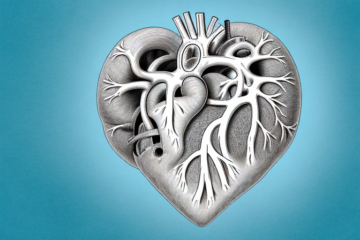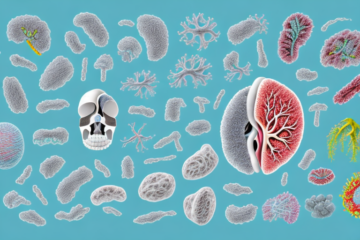The human body is a complex system of organs and tissues, each with their unique functions and purposes. While many organs are vital to our everyday lives, some are often overlooked, like the appendix. The appendix is a small pouch-like structure attached to the large intestine. Though its function is not entirely clear, it’s believed to play a role in maintaining the immune system. However, it can become inflamed, leading to a condition known as appendicitis. In this article, we will take an in-depth look at the anatomy of the appendix, the causes and symptoms of appendicitis, and the various treatment options available.
Understanding the Human Appendix
The appendix is a tiny tissue-like structure located in the lower right abdomen. It’s a worm-shaped tube that is 2-4 inches long and about the thickness of a finger. The appendix has a role in the immune system, where it produces and stores lymphatic tissue. Lymphatic tissue helps fight off infections and diseases, making the appendix an essential part of the body’s defense mechanisms.
Despite its importance, the appendix is often considered a vestigial organ, meaning it has lost its original function over time. This is because humans can survive without an appendix, and it is not essential for daily bodily functions. However, recent studies have shown that the appendix may play a role in maintaining a healthy gut microbiome, which is crucial for overall health and well-being.
In some cases, the appendix can become inflamed and infected, leading to a condition called appendicitis. This is a medical emergency that requires immediate treatment, as a ruptured appendix can cause life-threatening complications. Symptoms of appendicitis include abdominal pain, fever, nausea, and vomiting. If you experience these symptoms, seek medical attention right away.
Common Diseases Associated with the Appendix
While the appendix typically functions without any problems, it can become infected, inflamed, or even rupture. Appendicitis is the most common disease associated with the appendix. It occurs when the appendix becomes inflamed, and its walls begin to thicken. The condition can be caused by various factors, such as blocked stool, foreign objects, or even viral infections.
Another disease associated with the appendix is appendiceal tumors. These are rare, but can be cancerous or non-cancerous. Symptoms may include abdominal pain, nausea, and vomiting. Treatment may involve surgery to remove the appendix and any affected tissue.
In some cases, the appendix may also develop a condition called appendiceal mucocele. This occurs when the appendix becomes filled with mucus, causing it to expand. While it is usually non-cancerous, it can lead to complications such as rupture or infection. Treatment may involve surgery to remove the appendix.
Symptoms of Appendicitis
Appendicitis is characterized by several symptoms that can range from mild to severe. The most common symptom is pain in the lower right abdomen, typically starting around the belly button and then moving towards the right side. Other symptoms include nausea, vomiting, fever, and loss of appetite. In some cases, appendicitis can cause constipation or diarrhea, leading to confusion in diagnosis since these symptoms can be signs of other medical conditions.
It is important to note that not everyone with appendicitis will experience all of these symptoms. Some people may only have mild pain or discomfort, while others may have more severe symptoms. Additionally, the severity of symptoms does not always indicate the severity of the condition. In some cases, a person may have a ruptured appendix with only mild symptoms, while in other cases, a person may have a non-ruptured appendix with severe symptoms.
If left untreated, appendicitis can lead to serious complications such as a ruptured appendix, which can cause infection and inflammation in the abdominal cavity. This can lead to a condition called peritonitis, which can be life-threatening if not treated promptly. Therefore, it is important to seek medical attention if you experience any symptoms of appendicitis, especially if they are severe or persistent.
How to Diagnose Appendicitis?
Diagnosing appendicitis involves a combination of physical examinations and laboratory tests. The doctor will begin by checking the patient’s abdomen for tenderness and swelling and asking about their symptoms. Blood tests are then done to check for any signs of infection or inflammation. An ultrasound or CT scan may also be conducted to confirm the diagnosis.
It is important to note that diagnosing appendicitis can be challenging, as the symptoms can be similar to other conditions such as gastroenteritis or urinary tract infections. In some cases, a patient may not exhibit all the typical symptoms of appendicitis, making it even more difficult to diagnose. Therefore, it is crucial to seek medical attention if you experience any abdominal pain or discomfort, especially if it is accompanied by fever, nausea, or vomiting.
Understanding the Causes of Appendicitis
Appendicitis can be caused by various factors, but it is most commonly caused by a blockage or obstruction of the appendix’s opening. Some of the causes of such blockage include fecal matter, foreign objects accidentally ingested, or even cancer. In some cases, an infection elsewhere in the body, such as the gastrointestinal tract, can also spread to the appendix, causing inflammation and appendicitis.
Another potential cause of appendicitis is a genetic predisposition. Studies have shown that individuals with a family history of appendicitis are more likely to develop the condition themselves. Additionally, certain medical conditions, such as cystic fibrosis, can increase the risk of developing appendicitis.
Symptoms of appendicitis can include abdominal pain, nausea, vomiting, and fever. If left untreated, the appendix can rupture, leading to a potentially life-threatening infection. Treatment typically involves surgical removal of the appendix, known as an appendectomy. In some cases, antibiotics may be prescribed to treat the infection before surgery.
Treatment Options for Appendicitis
The only effective treatment for appendicitis is to remove the appendix surgically. An appendectomy procedure can be done either through traditional open surgery or laparoscopy, which is minimally invasive. In some cases, if the appendix has ruptured, antibiotics may be prescribed to reduce the risk of infection. It is essential to note that delaying treatment is not advisable since appendicitis can lead to severe complications.
After surgery, patients may experience some pain and discomfort, which can be managed with pain medication. It is also important to follow the doctor’s instructions for post-operative care, including rest and avoiding strenuous activities for a certain period of time.
In rare cases, complications may arise after surgery, such as bleeding, infection, or damage to nearby organs. Patients should be aware of the signs and symptoms of these complications and seek medical attention immediately if they occur.
Surgery for Appendicitis: Types and Risks Involved
Appendectomy can be performed in two ways: open surgery or laparoscopy. In open surgery, a small incision is made in the abdomen, and the appendix is removed. Laparoscopy is minimally invasive and involves making three or four small incisions and using a camera and surgical tools to remove the appendix. Like any surgery, appendectomy comes with certain risks such as bleeding, infection, and anesthesia complications. However, the risks are generally low, and the procedure has an excellent success rate.
It is important to note that recovery time after an appendectomy can vary depending on the type of surgery performed and the individual patient. Open surgery may require a longer hospital stay and recovery time, while laparoscopy is often associated with a quicker recovery and less pain. Patients should follow their doctor’s instructions for post-operative care, including taking pain medication as prescribed, avoiding strenuous activity, and monitoring for signs of infection or complications.
Post-Operative Care after Appendix Surgery
After undergoing appendectomy, the patient is closely monitored to ensure a smooth recovery. Pain medication may be prescribed to manage any discomfort or pain. It is essential to follow post-operative instructions and avoid strenuous activities for a few weeks until the body has fully healed.
Additionally, the patient may be advised to eat a light diet and avoid foods that are difficult to digest, such as spicy or fatty foods. It is also important to keep the incision site clean and dry to prevent infection. The patient should contact their healthcare provider if they experience any unusual symptoms, such as fever, excessive bleeding, or severe pain.
Complications of Appendicitis: What to Look out For?
Appendicitis can lead to several complications if left untreated or if complications arise during surgery. For instance, the appendix can rupture, leading to abscesses, a condition where pus collects around the inflamed organ. Additionally, ruptured appendix can lead to peritonitis, a severe and life-threatening infection that can spread throughout the abdomen.
Another complication of appendicitis is bowel obstruction, which occurs when the inflamed appendix causes a blockage in the intestine. This can lead to severe abdominal pain, nausea, and vomiting. In some cases, surgery may be required to remove the obstruction.
In rare cases, appendicitis can also lead to sepsis, a potentially life-threatening condition that occurs when the body’s immune system overreacts to an infection. Symptoms of sepsis include fever, rapid heartbeat, and difficulty breathing. If you experience any of these symptoms after being diagnosed with appendicitis, seek medical attention immediately.
Prevention Techniques for Appendicitis
While appendicitis cannot be prevented entirely, the risk can be reduced by maintaining a healthy diet with plenty of fiber, staying hydrated, and exercising regularly. It is essential to avoid prolonged exposure to people with infectious diseases or consuming contaminated food and water. If you experience any symptoms of appendicitis, it is crucial to seek medical attention promptly to prevent complications.
In addition to the above prevention techniques, it is also important to maintain good hygiene practices, such as washing your hands regularly and properly. This can help prevent the spread of bacteria and viruses that can cause infections, including appendicitis. It is also recommended to avoid smoking and limit alcohol consumption, as these habits can weaken the immune system and increase the risk of developing infections. By following these prevention techniques, you can reduce your risk of developing appendicitis and maintain good overall health.
Alternative Treatments for Appendicitis
There is no alternative or natural cure for appendicitis, and surgical removal is the best solution. However, certain home remedies can help ease the symptoms and speed up the recovery process. These include drinking plenty of fluids, applying a heat pad to the abdomen to alleviate pain, and getting enough rest.
In addition to home remedies, it is important to follow the doctor’s instructions and take any prescribed medications. Antibiotics may be given before or after surgery to prevent infection. It is also important to avoid strenuous activities and heavy lifting for several weeks after surgery to allow the body to fully heal.
Home Remedies to Ease Symptoms of Appendicitis
Along with pain relief techniques, there are several home remedies that can help ease the symptoms of appendicitis. These include consuming foods low in fat and high in fiber like bananas, potatoes, and rice. It is important to avoid eating spicy or acidic foods or anything that aggravates the stomach. Consultation with a physician is recommended before venturing into such remedies.
In addition to dietary changes, applying a warm compress to the lower right abdomen can also provide relief from appendicitis symptoms. This can be done by soaking a towel in warm water and placing it on the affected area for 15-20 minutes at a time. It is important to note that while these home remedies may provide temporary relief, they are not a substitute for medical treatment. If you suspect you have appendicitis, seek medical attention immediately.
Diet to Follow after Appendix Surgery
After undergoing appendectomy, it is essential to follow specific dietary restrictions to promote the healing process. It is important to consume low-fat, easily digestible foods like soup and crackers for a few days after surgery. Taking small and frequent meals throughout the day also helps. It is important to avoid foods high in fiber or solid foods until the body has fully recovered.
In addition to following a low-fat and easily digestible diet, it is also important to stay hydrated after appendix surgery. Drinking plenty of water and clear fluids like broth, tea, and juice can help prevent constipation and promote healing. It is also recommended to avoid alcohol and caffeine as they can dehydrate the body. It is best to consult with a doctor or a registered dietitian to create a personalized diet plan based on individual needs and recovery progress.
Long-Term Effects of Removing the Appendix
The human body can function entirely without the appendix, and its removal has no long-term side effects. Several studies show that a person’s immunity is not affected after the appendix’s removal, and the person can lead a happy, healthy life. However, it is essential to recover fully before resuming any strenuous activities or physical exercise.
Although the appendix is not considered a vital organ, it does play a role in the immune system. Recent studies have shown that the appendix contains a significant amount of beneficial bacteria that help fight off infections and maintain a healthy gut microbiome. However, the removal of the appendix does not seem to have any significant impact on the overall health of an individual.
In rare cases, complications may arise after an appendectomy, such as infection, bleeding, or damage to nearby organs. It is crucial to follow the doctor’s instructions carefully and report any unusual symptoms immediately after the surgery. With proper care and attention, most people can recover fully and resume their normal activities within a few weeks.
Importance of Timely Diagnosis and Treatment of Appendicitis
Appendicitis can be a severe condition that leads to potentially life-threatening complications, most of which can be prevented through timely diagnosis and treatment. Knowing the symptoms and risk factors can help individuals seek medical attention promptly, leading to better treatment outcomes. It is critical to avoid self-diagnosis and always consult a physician for any medical concerns.
Some common symptoms of appendicitis include abdominal pain, nausea, vomiting, and fever. However, these symptoms can also be indicative of other conditions, making it essential to seek medical attention for an accurate diagnosis. Delaying treatment can lead to the appendix rupturing, which can cause infection and inflammation in the abdominal cavity. In severe cases, this can lead to sepsis, a potentially life-threatening condition. Therefore, it is crucial to recognize the symptoms and seek medical attention promptly to prevent complications and ensure a speedy recovery.
Conclusion
Appendix, while small, is an essential part of the immune system. When it becomes infected or inflamed, the condition is known as appendicitis, which can lead to complications if left untreated. Swift diagnosis and appropriate treatment are critical in ensuring the best outcomes. Surgical appendectomy is the best solution in most cases, followed by a clear path to recovery through adequate rest, diet, and aftercare. It’s essential to maintain a healthy lifestyle to reduce the risk of developing appendicitis and to seek medical attention promptly should it occur.
Recent studies have shown that there may be a link between the gut microbiome and the development of appendicitis. Research suggests that a disruption in the balance of bacteria in the gut may contribute to the inflammation of the appendix. Further studies are needed to fully understand this relationship and its implications for prevention and treatment.
In rare cases, non-surgical treatment options may be considered for appendicitis, such as antibiotics or drainage of an abscess. However, these options are typically reserved for patients who are not good candidates for surgery or who have a mild case of appendicitis. It’s important to discuss all treatment options with your healthcare provider to determine the best course of action for your individual situation.










